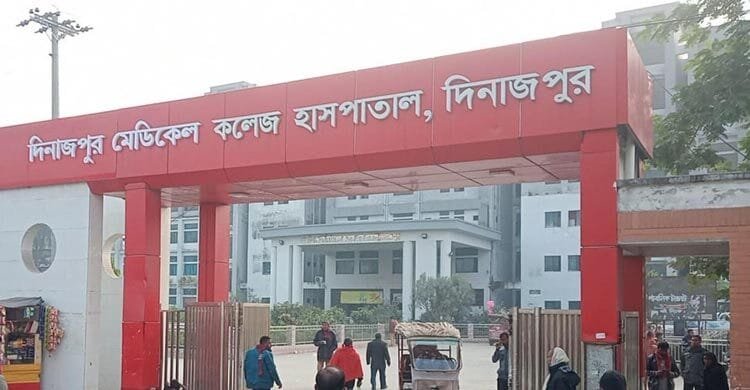Dinajpur Medical College Hospital gets popular among heart patients

Amid increasing difficulties in obtaining Indian visas and ongoing economic challenges, the trend of seeking medical treatment abroad is steadily declining. In its place, the northern district of Dinajpur in Bangladesh is emerging as a trusted centre for cardiac care. What was once considered a setback for many patients—visa denial or financial constraints—has now turned into an unexpected blessing, as patients are discovering high-quality, affordable treatment within the country.
Patients who previously looked to India for advanced cardiac procedures are now being treated successfully at home, often at a fraction of the cost. The Dinajpur Medical College Hospital, alongside several private hospitals in the district, has reported a noticeable increase in the number of heart patients in recent months. According to hospital authorities, the patient influx has grown significantly compared to the previous year.
Shahin Alam from Ranipur in Dinajpur Sadar upazila initially planned to seek treatment in India, but visa complications and financial difficulties prevented him from going. Instead, he was admitted to the Cardiology Department at Dinajpur Medical College Hospital, where on 24 September, a pacemaker was successfully implanted. His father, Azim Uddin, explained that while the same procedure would have cost BDT 500,000 to 600,000 in India, at Dinajpur Medical College Hospital it cost only BDT 175,000.
Similarly, Arman Ali from Pirganj in Thakurgaon shared his experience. Unable to obtain a visa, he received treatment at Dinajpur Medical College Hospital, where doctors placed a stent in his heart. “Excluding the cost of the stent, I only paid around BDT 2,000,” he said. “Had I been granted the visa, I would never have realised this level of treatment was possible here at such low cost.” He also praised Dr Shahriar Kabir, the Head of Cardiology at Dinajpur Medical College Hospital, for his expert care.
The Cardiology Department at the 500-bed Dinajpur Medical College Hospital now has 90 dedicated beds. Hospital data indicates that every month, approximately 80 patients undergo angiography, 20 receive stents, and 10 are fitted with pacemakers—figures that far exceed those of previous years.
Dr Shahriar Kabir confirmed that all major cardiac procedures including angiography, angioplasty, stenting, and pacemaker implantation are available at the hospital. Only bypass surgeries require referral to Dhaka. “There is no longer a need to go abroad,” he said firmly. “Bangladesh now offers quality heart care.”
Dr Md Fazlur Rahman, the hospital director, acknowledged that the decline in foreign treatment-seeking has led to a rise in local patient numbers. He added that efforts are ongoing to increase medical equipment and facilities to meet demand.
Private institutions such as Zia Heart Foundation Hospital and Care Specialised General Hospital also contribute to Dinajpur’s growing reputation. Zia Heart Foundation offers a full range of cardiac services, including bypass surgery.
Sahera Begum from Munshipara, Rangpur, who received prompt treatment there, said, “I recovered quickly and didn’t have to travel abroad. That feels great.”
According to AKM Azad, General Secretary of Zia Heart Foundation, since starting operations in 2002, the hospital has treated over 126,000 patients, becoming a trusted name in the north.
Experts believe that trust in local healthcare, prompted by visa issues, will not only save patients money but also help build renewed confidence in the national health system.



